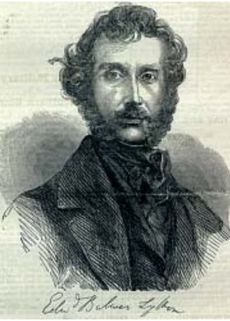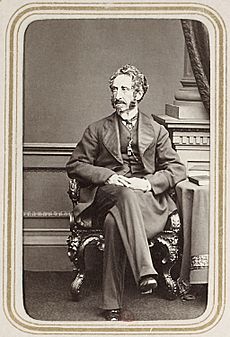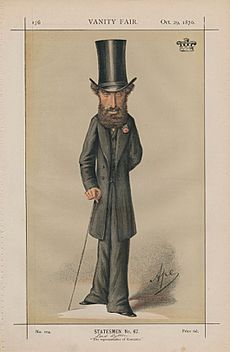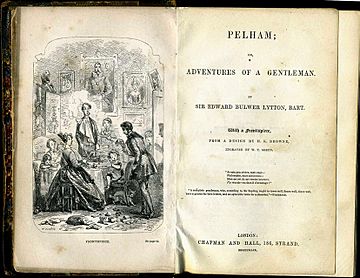Edward Bulwer-Lytton facts for kids
Quick facts for kids
The Lord Lytton
|
|
|---|---|
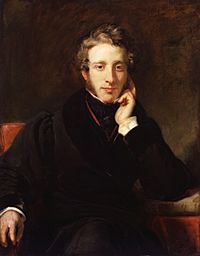 |
|
| Secretary of State for the Colonies | |
| In office 5 June 1858 – 11 June 1859 |
|
| Monarch | Victoria |
| Prime Minister | The Earl of Derby |
| Preceded by | Lord Stanley |
| Succeeded by | The Duke of Newcastle |
| Personal details | |
| Born |
Edward George Earle Lytton Bulwer
25 May 1803 London, England |
| Died | 18 January 1873 (aged 69) Torquay, England |
| Political party | Whig (1831–1841) Conservative (1851–1866) |
| Spouse |
Rosina Doyle Wheeler
(m. 1827) |
| Children | 2, including Robert |
| Parents | William Earle Bulwer Elizabeth Barbara Warburton-Lytton |
| Alma mater | Trinity College, Cambridge Trinity Hall, Cambridge |
Edward George Earle Lytton Bulwer-Lytton, 1st Baron Lytton (born May 25, 1803 – died January 18, 1873) was a famous English writer and politician. He was a member of Parliament for many years. First, he was a Whig from 1831 to 1841. Later, he joined the Conservative party from 1851 to 1866.
He held an important government job as Secretary of State for the Colonies from 1858 to 1859. In this role, he helped establish British Columbia in Canada. He was even offered the Crown of Greece in 1862, but he said no. In 1866, he was given the title of Baron Lytton.
Bulwer-Lytton's books and plays were very popular during his lifetime. He created many well-known phrases that people still use today. These include "the almighty dollar" and "the pen is mightier than the sword". He also wrote the famous opening line "It was a dark and stormy night." This line is now used in a funny writing contest called the Bulwer-Lytton Fiction Contest. This contest looks for the "worst opening sentence of all possible novels."
Contents
Life of Edward Bulwer-Lytton
Edward Bulwer was born on May 25, 1803, in London, England. His father was General William Earle Bulwer. His mother was Elizabeth Barbara Lytton, whose family owned Knebworth House. He had two older brothers, William and Henry.
When Edward was four, his father died, and his mother moved the family to London. At 15, his tutor encouraged him to publish his first poems. Around this time, he fell in love, but the woman married someone else. He later said this loss affected his whole life.
In 1822, Bulwer-Lytton went to Trinity College, Cambridge. He later moved to Trinity Hall, Cambridge. In 1825, he won a special award for his English poetry. The next year, he got his degree and printed a small book of poems. He bought a position in the army in 1826 but sold it in 1829 without serving.
In 1827, he married Rosina Doyle Wheeler, a famous Irish beauty. His mother did not approve and stopped giving him money. This meant he had to work to support himself. They had two children: Emily and Robert. Robert later became the Governor-General of India.
His busy writing and political life put a lot of stress on his marriage. In 1833, they separated, and their separation became legal in 1836. Rosina later wrote a book that made fun of her husband. She continued to criticize him for many years.
In 1843, his mother passed away. He inherited Knebworth House and kept his mother's room exactly as she left it. In 1844, he officially changed his last name to Bulwer-Lytton, as his mother had wished.
Bulwer-Lytton had health problems, especially with his ear. For the last few years of his life, he lived in Torquay to rest. He died on January 18, 1873, just before his 70th birthday. He was buried in Westminster Abbey, even though he had not wanted to be.
Bulwer-Lytton's Political Career
Bulwer-Lytton started his political journey in 1831. He was elected as a Member of Parliament for St Ives. Later, he represented Lincoln for nine years. He supported the Reform Bill, which changed how people voted.
In 1838, he was made a baronet, a special title. He left Parliament in 1841 and traveled a lot. He returned to politics in 1852, joining the Conservative party. He represented Hertfordshire until 1866. That year, he was given the title of Baron Lytton.
In 1858, he became the Secretary of State for the Colonies. This was an important job where he worked with his friend Benjamin Disraeli, who later became Prime Minister.
Establishing British Columbia
When gold was discovered in the Fraser Canyon Gold Rush in Canada, Bulwer-Lytton played a key role. As Colonial Secretary, he chose Richard Clement Moody to lead a group of 172 Royal Engineers. These engineers were sent to establish British law and order in the new Colony of British Columbia.
Bulwer-Lytton wanted to send the "best of British culture" to the colony. He saw Moody as the perfect "English gentleman and British Officer." He wanted to create a "second England on the shores of the Pacific." The town of Lytton, British Columbia was named after him in 1858.
Bulwer-Lytton's Literary Works
Bulwer-Lytton began his writing career in 1820 with a book of poems. He wrote many different types of stories, including historical fiction, mysteries, romances, and even early science fiction. He wrote a lot to support his lifestyle, sometimes publishing his works without his name.
His novel Falkland (1827) was a small success. But Pelham (1828) made him famous. It was known for its clever writing and funny look at fashion and society.
He became very popular with books like The Pilgrims of the Rhine (1834) and The Last Days of Pompeii (1834). The Last Days of Pompeii was inspired by a painting he saw in Italy. Other popular books included Rienzi (1835) and Harold, the Last of the Saxons (1848).
Bulwer-Lytton also wrote the spooky story The Haunted and the Haunters (1859). His novel A Strange Story (1862) even influenced Bram Stoker's famous book Dracula.
One of his most interesting works was Vril: The Power of the Coming Race (1871). This book explored his interest in the occult and helped create the science fiction genre. It tells the story of a hidden race living underground. The word "vril" from his book even gave its name to the meat extract, Bovril.
His play Money (1840) was very successful and performed in London and New York. He also convinced Charles Dickens to change the ending of Great Expectations to make it happier for readers.
Legacy and Influence
Bulwer-Lytton's works had a lasting impact in many areas.
Influence on Theosophy
Writers of theosophy, a spiritual movement, were inspired by Bulwer-Lytton. People like Helena Blavatsky used his ideas from books like The Last Days of Pompeii and Zanoni in their own writings.
The Bulwer-Lytton Fiction Contest
The famous opening line "It was a dark and stormy night" from his novel Paul Clifford became very well known. It was made even more popular by the Peanuts comic strip, where Snoopy often started his stories with it. This line is now the inspiration for the annual Bulwer-Lytton Fiction Contest, which challenges writers to create the worst possible opening sentence for a novel.
Operas and Plays
Many of Bulwer-Lytton's novels were turned into operas. One of the most famous is Rienzi, der Letzte der Tribunen (1842) by Richard Wagner, which became even more famous than the book. His play The Lady of Lyons was also adapted into several operas. His novel The Last Days of Pompeii became a successful opera called Jone (1858).
His novels were also adapted into popular plays in New York. The Last Days of Pompeii had a very long run on stage.
Magazines and Translations
Besides his writing, Bulwer-Lytton edited the New Monthly magazine in 1831. He also started the Monthly Chronicle in 1841. His works were translated into many languages, including German, French, and Spanish. In 1879, his book Ernest Maltravers was the first full Western novel to be translated into Japanese.
Place Names
Many places around the world are named after him. In Queensland, Australia, there's a suburb called Lytton and a town called Bulwer. There are also towns named Lytton in Quebec, Canada, and Iowa, USA. Lytton, British Columbia in Canada is also named after him. In New Zealand, you can find Lytton Road and Lytton High School in Gisborne, and a small place called Bulwer.
Works
Novels
- Falkland (1827)
- Pelham: or The Adventures of a Gentleman (1828)
- The Disowned (1829)
- Devereux (1829)
- Paul Clifford (1830)
- Eugene Aram (1832)
- Godolphin (1833)
- The Last Days of Pompeii (1834)
- The Pilgrims of the Rhine (1834)
- Rienzi, the last of the Roman tribunes (1835)
- Ernest Maltravers; or The Eleusinia (1837)
- Alice, or The Mysteries (1838)
- Leila; or, The Siege of Granada (1838)
- Zicci: a Tale (1838)
- Night and Morning (1841)
- Zanoni (1842)
- The Last of the Barons (1843)
- Lucretia; or, The Children of Night (1846)
- Harold, the Last of the Saxons (1848)
- The Caxtons: A Family Picture (1849)
- My Novel, or Varieties in English Life (1853)
- The Haunted and the Haunters; or, The House and the Brain (1859)
- What Will He Do With It? (1858)
- A Strange Story (1861–1862)
- The Coming Race (1871), republished as Vril: The Power of the Coming Race
- Kenelm Chillingly (1873)
- The Parisians (1873)
- Pausanias, the Spartan – Unfinished (1873)
Plays
- The Duchess de la Vallière (1837)
- The Lady of Lyons (1838)
- Richelieu (1839)
- Money (1840)
- Not So Bad as We Seem, or, Many Sides to a Character: A Comedy in Five Acts (1851)
- The Rightful Heir (1868)
Images for kids
See also
 In Spanish: Edward Bulwer-Lytton para niños
In Spanish: Edward Bulwer-Lytton para niños
 | Claudette Colvin |
 | Myrlie Evers-Williams |
 | Alberta Odell Jones |


